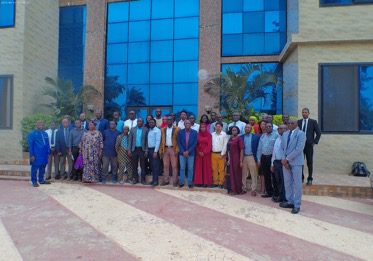With a population of 2.5 million people, The Gambia currently has less than 40 pharmacists in the whole country, serving the pharmaceutical needs of the people both in the public and private sector, something that runs far below the World Health Organization recommended guidelines.
Since then, the Ministry of Health in collaboration with the University of The Gambia (UTG) and key stakeholders with funding from World Bank is about to roll out a need-based pharmacy curriculum programme at the University of The Gambia.
It was against this backdrop that the Ministry in collaboration with key stakeholders gathered at Metzy Hotel on Tuesday to start developing a competency-based curriculum for a Doctorate Programme in Pharmacy at the University of The Gambia.
Welcoming the gathering, Fatoumatta Samateh, deputy director of the National Pharmaceutical Services, described the day as another milestone in the history of pharmacy in the country as they gathered to begin the development of a curriculum of doctor in pharmacy programme at the University of The Gambia.
“You would have been aware that the University of The Gambia has been training other professionals for the past two decades, but pharmacists are not one of those professionals. And it is high time that became a thing of the past.”
To that end, she commended the government of The Gambia through the Ministry of Health and the World Bank for providing not only the funding support but also technical support and the University of The Gambia for agreeing to run the programme.
She reminded that there are currently has less than 40 pharmacists in the whole country, serving the pharmaceuticals needs of the people both in the public and private health sectors.
This, she said, is far below the World Health Organization’s recommended benchmark, which she added, states that there should be 4.5 health care professionals per 1000 population.
“So, with our population of 2.4 million people, we are required to have about 10,000 pharmacists altogether,” she added.
With the fewer number of pharmacists in the country, Samateh acknowledged that the country is far below the required numbers, further outlining the importance of pharmacists in the country’s heath care sector.
For his part, Lloyd Matowe, director of Pharmaceutical System Africa, the consultancy firm tasked in developing this need-based curriculum alongside key stakeholders, described the people of The Gambia as ‘nice and welcoming’, something he experienced firsthand on two occasions.
“In my journey across Africa, I worked in over 26 countries in Africa. When I moved to Geneva, Switzerland to work with the Global Fund and the first thing you do is to try to look for people who look like you.”
She spoke highly of one Madam Talla Jallow, a Gambian who worked at the Global Fund at the time for her welcoming nature, further expressing delight to be in the country.
“I am delighted to be here and we are here today not just the curriculum development, but to indoctrinate ourselves on the importance of pharmacy in pharmacy programmes in the health care system. Of all the expense in a health system and the doctors recognised that 7 percent is on the products. And if the products are not managed well, we are not doing any service to our money.’
Deputising for the Vice Chancellor of the University of The Gambia, Prof. Gabriel Ogun, provost, School of Medicine and Allied Health Sciences at UTG, recalled that in 2022 seventy children died in the country and that was a sad time for the country.
As a pathologist, he said, he directly performed autopsy on three of the children, adding that when he saw the first signs of the report, he realised that there was a problem in the country.
Prof Ogun recalled that one of the challenges was that there weren’t enough pharmacists in the system and in view of the foregoing, authorities set up a panel, which he said, recommended the need for establishment of Pharmacy Programme in the country.
To that end, he called on the Ministry and stakeholders to support the programme in order to achieve their desired objectives.
Declaring the event open, Dr. Momodu T. Nyassi, deputy director of Health Services at the Ministry of Health, underscored the importance of human resource development, saying the Minister for Health has always emphasised that one cannot run a competent health system ‘if you lack human, financial and material resources.’
He laid particular emphasis on human resources and that once you have that, one can manage the rest.
To that end, Dr. Nyassi revealed that Minister Samateh has tasked almost all the Directorates at the Ministry to come up with training programmes that will strengthen the health system.
Thus, he added, this is not the first training programme they have started, citing what they have done with the Directorate of Nursing, where they have started a post-graduate programme in Nursing.
“We have done with the Clinicians and here we are today about to begin a post-graduate training in Pharmacy. Next is laboratory and this all is because we want to strengthen our health system.”
Dr Nyassi indicated that is why they worked very hard to secure a grant from World Bank for the establishment of the training programme, saying they’ve worked with UTG and all key stakeholders just to make the programme a reality.
Source link : https://thepoint.gm/africa/gambia/headlines/utg-to-introduce-pharmacy-curriculum
Author :
Publish date : 2024-01-25 08:00:00
Copyright for syndicated content belongs to the linked Source.
